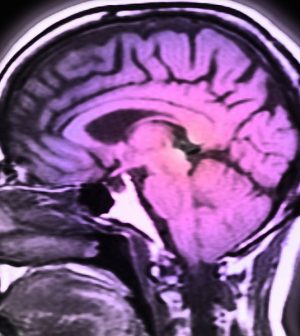- 8 Ways to Increase Dopamine Naturally
- 7 Best Breads for Maintaining Stable Blood Sugar
- Gelatin vs. Collagen: Which is Best for Skin, Nails, and Joints?
- The Long-Term Effects of Daily Turmeric Supplements on Liver Health
- Could Your Grocery Store Meat Be Causing Recurring UTIs?
- Are You Making This Expensive Thermostat Error This Winter?
- Recognizing the Signs of Hypothyroidism
- 10 Strategies to Overcome Insomnia
- Could Artificial Sweeteners Be Aging the Brain Faster?
- Techniques for Soothing Your Nervous System
Brain Changes May Be Hallmark of Anorexia

People with anorexia nervosa show significant shrinkage in three important areas of the brain, new research reveals.
The researchers said their study findings highlight the importance of early treatment, to prevent long-term structural brain changes in people with the eating and mental health disorder.
The study involved analysis of nearly 2,000 brain scans from people with anorexia, including those in recovery, and a control group of people with no history of the eating disorder.
People with anorexia showed “sizeable reductions” in three critical measures of the brain: cortical thickness; subcortical volumes; and cortical surface area.
Reductions in brain size are believed to be due to the loss of brain cells or the connections between them, the study authors explained in the report published recently in Biological Psychiatry.
The reductions in brain size and shape among those with anorexia was between two and four times larger than among people with other mental health conditions, such as depression, attention-deficit/hyperactivity disorder or obsessive-compulsive disorder.
The troubling shrinkage might be associated with significant reductions in their weight, according to the international team of researchers.
Those brain reductions were “less noticeable in patients already on the path to recovery. This is a good sign, because it indicates that these changes might not be permanent. With the right treatment, the brain might be able to bounce back,” lead researcher Esther Walton, from the University of Bath’s department of psychology, said in a university news release.
Current treatment for anorexia typically involves cognitive behavioral therapy and weight gain.
The study authors worked together as part of the ENIGMA Eating Disorders Working Group, run out of the University of Southern California.
“Scientists from 22 centers worldwide pooled their brain scans to create the most detailed picture to date of how anorexia affects the brain. The brain changes in anorexia were more severe than in any other psychiatric condition we have studied. Effects of treatments and interventions can now be evaluated, using these new brain maps as a reference,” noted Paul Thompson, a professor of neurology and lead scientist for the ENIGMA consortium.
“This study is novel in terms of the thousands of brain scans analyzed, revealing that anorexia affects the brain more profoundly than any other psychiatric condition,” he added. “This really is a wake-up call, showing the need for early interventions for people with eating disorders.”
More information
There’s more on eating disorders at the U.S. Office on Women’s Health.
SOURCE: University of Bath, news release, June 7, 2022
Source: HealthDay
Copyright © 2026 HealthDay. All rights reserved.










